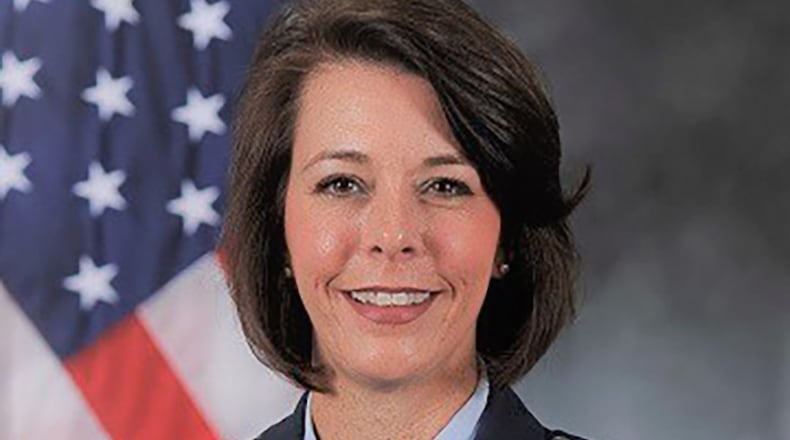Now the special assistant for public affairs to the Joint Chiefs of Staff chairman, Halfhill says self-awareness empowers leaders to connect and perform effectively.
“Nothing could be more important than representing the people we are sworn to protect,” Brig. Gen. Heather Pringle, AFRL commander, said before the presentation. “As learning organizations, there’s a lot out there that we don’t know, and today is the perfect opportunity to learn about ourselves and learn about leadership.”
When Halfhill asked presentation attendees to label their ideal performance as leaders in one word, they typed qualities like “compassionate,” “humble,” “open-minded” and “courageous” into the chat box. She and attendees alike, however, admitted that characteristics such as “dismissive,” stressed,” “unapproachable” and “rude” better related how they showed up on bad days.
A leader’s daily performance equals their potential – experience, education and practice – minus interference, the stuff that gets in the way, Halfhill proposed.
“Maybe I’m hungry and all I need is a Snickers bar; we’re lucky if that’s the problem,” Halfhill said. “But most of the time, the interference comes from inside our heads -- the doubt and fear that we’re trying to process on a daily basis.”
Halfhill explained this vulnerability springs from both the creativity and innovation their work requires and the care they maintain for their Airmen.
“We get up every single day as volunteers in this organization, and we put this uniform on or we wear our DOD badge, which means in some ways our hearts are on the line,” Halfhill said. “And when our hearts are on the line, we’re emotionally invested. We can be disappointed, and that exposes us.”
Embraced and properly channeled, leaders can flip their vulnerability from an interference into a bedrock for trust and empathy, which in turn leads to productivity, Halfhill told attendees.
She suggested leaders incorporate emotion back into Air Force doctrine, too, as they navigate race relations, suicide, assault and other tough issues that impact the mission. In the Air Force’s earliest instructions – dating to 1948 – topics like confidence, belonging, kindness, mercy, self-confidence, forgiveness, shame and love dominated the discussion in conjunction with the branch’s mission.
“If we don’t have the language of emotion, it makes it hard to engage our Airmen in a way that builds connection,” the colonel added.
Halfhill urged attendees to commit to one action from the principles they learned. She closed her presentation with a quote from Brené Brown, who highlighted Halfhill’s anecdotes and ideas in her book, “Dare to Lead: Brave Work. Tough Conversations. Whole Hearts”: “Who you are ... is how you lead.”
The full presentation is available to watch at www.youtube.com/watch?v=zOEItp1tOHc&feature=youtu.be.
About the Author
